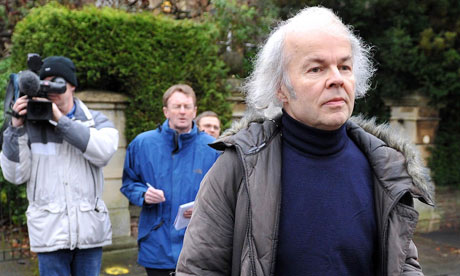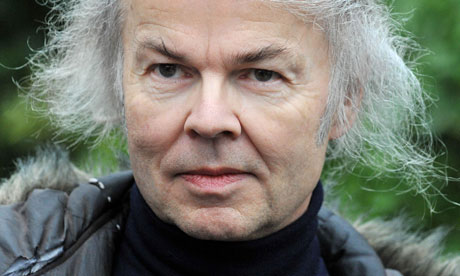We start our report in the Third World’s richest nation, Italy.
I haven’t blogged about the Sollecito-Knox Satanic ritual murder case in my local provincial capital Salem* for some time because the case has been unravelling as predicted. The star witness turned out to be a junkie-dealer who already testified for the police in two other murder trials (so much for drug addicts spending all day in bed). And the forensic procedures and DNA ‘evidence’ have been shredded by a long report from Rome’s Sapienza University.
We are now in the end game. The prosecutor Giuliano Mignini is firing off criminal defamation suits against people who point out he is unfit for office even in Italy at a rate unprecedented even for him. After the Rome academics introduced their report in court in Perugia this week, Mignini and his pals despatched two squad cars of police to Sapienza University in the capital in what appears to be a bizarre act of attempted intimidation. (The university sent them packing.) There is no real doubt that Sollecito and Knox are going to go free. The main point of interest for Italy-watchers is to ascertain that ABSOLUTELY NOBODY is held responsible for burning witches**. That includes the prosecutors; the half-witted magistrates; the gormless, overcharging lawyers; the thoroughly incompetent and corrupt police; the lazy and self-serving journalists who leaked the official side of the investigation at every turn in contravention of the law, and every other medievally-minded member of this shameful lynch-mob***.
When nobody is held responsible, it is important that you do not think of Sollecito and Knox. A couple of years inside will for them have been an interesting life experience. Think instead of the family of Meredith Kercher, the murdered girl. They are the real victims of this pantomime performed by adults with uniforms and titles.
*Known in dialect as Perugia
** Should read: ‘sending innocent kids to prison for life’.
*** Should read: ‘professional mafia’.
A link to another part of the Third World that I cover is provided by poor old Google. The same US internet firm which last year decided to stand up to China by refusing orders to censor its service recently got a demand via Mr Mignini to shut down an Italian blog he does not like. The China decision has cost Google much of its market share in the Middle Kingdom as the Chinese government does almost everything it can to slow down and disrupt Google’s service (pushing many users to move to the Chinese Google rip-off provider, Baidu). In Italy, Google has already been intimidated under the country’s media laws in a case that saw some of its executives sentenced to prison (they won’t actually go, because that only happens to kids and poor people). So what did Google do when Mignini came knocking? The firm immediately pulled the site Mignini does not like (without contacting the blogger), even though there is no prima facie evidence it contains anything libelous under Italian law. The firm that took on the Dragon is caving in Italy. However, the blog in question has been moved to WordPress (which I use!), and which so far seems to have the necessary cojones for our Italian adventure.
The global battle against men who live with their mums, men with comb-over hair-cuts and men and women who call themselves ‘doctor’ but don’t actually have a doctorate, goes on.
We close today on the subject of the recent, horrific high-speed rail crash in China’s Zhejiang province and the official efforts to (literally) bury the truth of what happened (with corpses still inside). Rather than more news reports that you have probably already seen, here is a translation of Han Han, China’s most famous blogger. I wonder, is there anything in these lines that rings a bell for Italians with regard to the conduct of their own ‘professional’ classes:
“The Derailed Country”
You ask, why are they acting like a bunch of lunatics?
They think they’re the picture of restraint.
You ask, why can’t they tell black from white, fact from fiction?
They think they’re straight shooters, telling it like it is.
You ask, why are they running interference for murders?
They think they’ve thrown their friends under the bus. And they’re ashamed.
You ask, why all the cover-ups?
They think they’re letting it all hang out.
You ask, why are they so irretrievably corrupt?
They think they’re hardworking and plain-living.
You ask, why are they so infuriatingly arrogant?
They think they’re the picture of humility.
You feel like you’re the victim. So do they.
They think: “During the Qing Dynasty, no one had television. Now everyone has a television. Progress!”
They think: “We’re building you all this stuff, what do you care what happens in the process? Why should you care who it’s really for, so long as you get to use it? The train from Shanghai to Beijing used to take a whole day. Now you’re there in five hours (as long as there’s no lightning). Why aren’t you grateful? What’s with all the questions?
“Every now and then, there’s an accident. The top leaders all show how worried they are. We make someone available to answer journalists’ questions. First we say we’ll give the victims 170,000 kuai apiece. Then we say we’ll give them 500,000. We fire a buddy of ours. We’ve done all that, and you still want to nitpick? How could you all be so close-minded? You’re not thinking of the big picture! Why do you want us to apologize when we haven’t done anything wrong? It’s the price of development.
“Taking care of the bodies quickly is just the way we do things. The earlier we start signing things, the more we’ll have to pay out in the end. The later we sign, the smaller the damages. Our pals in the other departments—the ones who knock down all the houses—taught us that one. Burying the train car was a bonehead move, true, but the folks upstairs told us to do it. That’s how they think: if there’s something that could give you trouble, just bury it. Anyway, the real mistake was trying to dig such a huge hole in broad daylight. And not talking it over with the Propaganda Department beforehand. And not getting a handle on all the photographers at the site. We were busy, ok? If there’s anything we’ve learned from all this, it’s that when you need to bury something, make sure you think about how big it is, and make sure you keep the whole thing quiet. We underestimated all that.”
They think that, on the whole, it was a textbook rescue operation—well planned, promptly executed, and well managed. It’s a shame public opinion’s gotten a little out of hand, but they think, “That part’s not our responsibility. We don’t do public opinion.”
They’re thinking: “Look at the big picture: We had the Olympics, we canceled the agricultural tax, and you guys still won’t cut us a break. You’re always glomming on to these piddling little details. No can-do spirit. We could be more authoritarian than North Korea. We could make this place poorer than the Sudan. We could be more evil than the Khmer Rouge. Our army’s bigger than any of theirs, but we don’t do any of that. And not only are you not thankful, but you want us to apologize! As if we’ve done something wrong?”
Society has people of means, and those without. There’s people with power, and those that have none. And they all think they’re the victim. In a country where everyone’s the victim, where the classes have started to decouple from one another, where it’s every man for himself, in this huge country whose constituent parts slide forward on inertia alone—in this country, if there’s no further reform, even tiny decouplings make the derailings hard to put right.
The country’s not moving forward because a lot of them judge themselves as if Stalin and Mao were still alive. So they’ll always feel like the victim. They’ll always feel like they’re the enlightened ones, the impartial ones, the merciful ones, the humble ones, the put-upon ones. They think the technological drumbeat of historical progress is a dream of their own making.
The more you criticize him, the more he longs for autocracy. The more you gaomao him (piss him off), the more he misses Mao.
A friend in the state apparatus told me, “You’re all too greedy. Forty years ago, writers like you would’ve been shot. So you tell me, have things gotten better, or have they gotten worse?”
I said, “No, you’re all too greedy. Ninety years ago, that kind of thinking would have gotten you laughed out of the room. So you tell me: after all that, have things gotten better, or have they gotten worse?”
Worthwhile links:
No longer on Google’s Blogger, but now at WordPress (great courtroom detail):
http://perugiashock.com
Long reports can also be funny when they deal with Italian police conduct:
http://knoxdnareport.wordpress.com/
The highlights of this report (at least those that have thus far been translated into English) are here:
- 5 big dos and 5 big don’’ts of crime scene investigation (Ooops. In Perugia the police and their ‘scientists’ did none of dos and all of the don’ts. Guess they had a bit of an off-day…)
http://knoxdnareport.wordpress.com/contents/conclusions-1/notes-on-inspection-and-collection-techniques/
- Overall conclusions that police and their ‘scientists’ ignored standard international protocols, failed to perform some tests, misinterpreted results in others, claimed to have ‘scientific’ results where they did not:
http://knoxdnareport.wordpress.com/contents/conclusions-2/
Note the discovery at Sapienza of starch (err…food) on the knife between the blade and the handle. Prosecution claimed the knife had been thoroughly cleaned by the killers, but their great forensics still uncovered (internationally-unacceptably small trace of) Kercher blood on the blade. Presence of starch residue now shows satanic ritutal murder gang cunningly cleaned off blood but not food from the knife… just like they cleaned all their fingerprints, bloodprints, DNA, etc from the room where Kercher died while leaving Rudy Guede’s evidence all over the place. I say: Burn ‘em already…
Finally, here is that YouTube video of the chief investigator on the Sollecito-Knox case again, talking about his ‘exquisitely psychological’ investigation. There have been another 2,000 hits since I first posted it. It deserves 2 million. You will not find anything funnier on a comedy programme, so settle for Italian reality and send it to your friends.
http://www.youtube.com/watch?v=sWkZPWRS3N0
Email, Print, TwittyFace this post:
Like this:
Like Loading...



